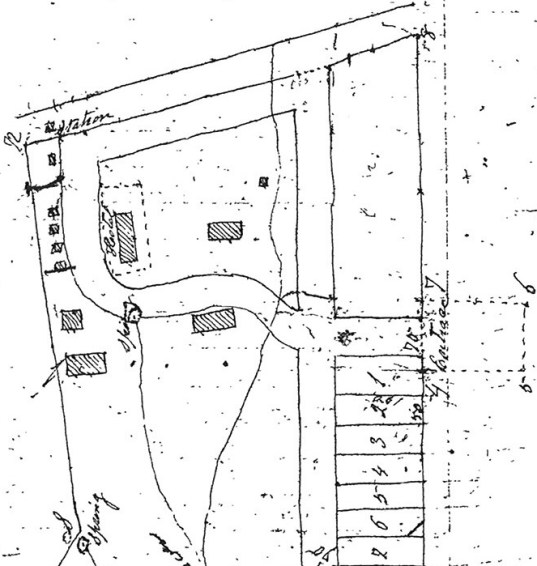| Grange Camp |
|
Formerly in the Vienna and Dunn Loring Vicinity Begun 1886 October 27, 2008 |
|
Previously, a camp existed near Vienna and Dunn Loring for grange members to gather for fairs and picnics; activities that advanced the mission of the grange movement. 
Fairfax Deed Bood M5(117):252, Courtesy Fairfax County Circuit Court Archives A Farmers’ Movement, led by the Order of the Patrons of Husbandry, grew out of Civil-War reconstruction. The economic outlook for the farmer following the Civil War was bleak. Financial capitalists and manufacturing/labor leaders were organizing, leaving the unorganized farmer vulnerable. The farmers’ economic situation deteriorated further. The high cost of the war resulted in high tariff rates beneficial to the manufacturers but detrimental to the farmer. As the demand for government revenue grew, taxation increased; primarily for the farmer who was taxed on tangible land, as opposed to laborers living in cities. Exasperating the problem, thousands of Northern soldiers were recalled home where they found a surplus labor force. This precipitated their westward migration to fertile farmland, and resulted in a general depreciation in value of eastern farmland. These conditions resulted in practical discussions on how to improve the prosperity of the American farmer.[1] The Order of the Patrons of
Husbandry was founded in 1867 by seven men; six of whom held positions within
the federal government. Oliver Hudson Kelley is regarded as the primary force
behind the Order’s formation. Kelley, a Following its creation, the
Patrons of Husbandry worked to unite Northern and Southern farmers. Northerners
assisted Southerners to achieve a recovery. Mr. Darden, a granger from The Order of the Patrons of Husbandry is a ritualistic fraternal organization whose local units are called subordinate granges. The term grange was chosen by Oliver Hudson Kelley, due to its association with farming, after seeing the term in the title of a book advertised at the time. Members of a grange are referred to as grangers. The fraternity’s long-established
purpose is to increase the mental, moral,
social and material prosperity of the farmer, foster understanding and
cooperation, and be self-sustaining.[5]
The Grange has been a proponent of schools, better roads, rural free mail Established prior to 1879, the
District Grange of Northern Virginia was composed of grangers from several
counties, including Grange
A movement
began with the District Grange in 1883 to arrange for a farmers’ fair and
picnic.[8]
It was originally held in Carpenters
constructed buildings and other laborers set up exhibitions for the first
Virginia Grange camp in 1886.[10]
A railroad depot was constructed nearby, and excursion rates were offered from The camp was described in 1888 as being …situated in an oak grove of forty acres,
and two good-sized wooden buildings contain the exhibits…A hotel located in the
center of the camp furnishes meals to visitors, and the grounds are dotted here
and there with booths and stands, a merry-go-round, shooting gallery and other
catch-penny devices…[12]
Farm animals
were often showcased at the fair. James P. Machen, of
Walney, exhibited three ewes in 1887.[13]
Alexander J. Wedderburn, editor of the Grange Journal, established his printing
operation at the camp.[14]
The lease for the [1] Thomas
Clark Atkeson, Semi-Centennial
History of the Patrons of Husbandry, [2] O. H.
Kelley, Origin and Progress of the Order
of the Patrons of Husbandry in the [3] Fred Brenckman, “The Grange Comes Home,” The [4] “The National Grange.” The
[5] Fred Brenckman, “The Grange Comes Home,” The [6] The [7] “The
Grange Picnic,” The [8] “ [9] “Journal
of the House of [10] “The
Grange [11]
“Excursion Rates to Grange [12] “The
Grange Camp,” The [13] “Tilting for a Silver Lance.” The [14] “ |
